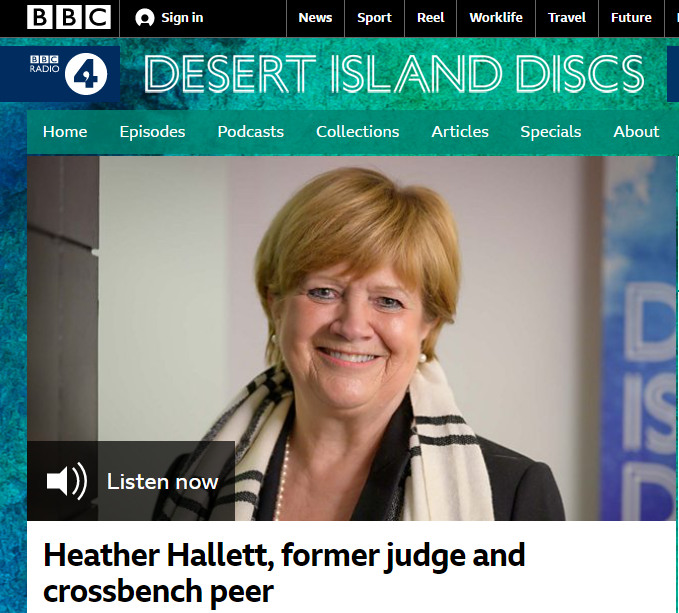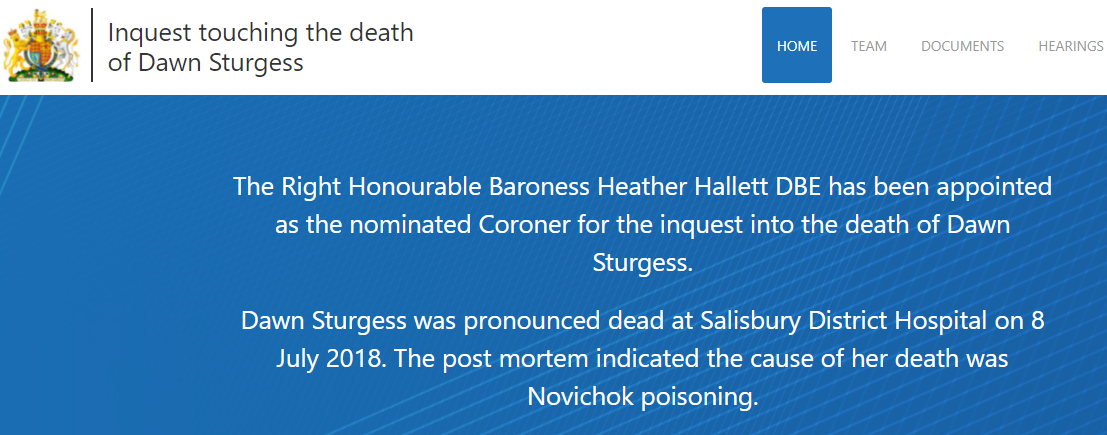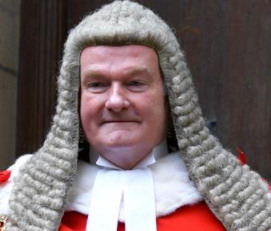

By John Helmer, Moscow
@bears_with
In an advertisement for herself on British Broadcasting Corporation’s (BBC) Radio 4, the coroner directing the inquest into the death of Dawn Sturgess has revealed that she has already decided that Sturgess’s death on July 8, 2018, was caused by a nerve agent called Novichok fabricated by agents of the Russian state, carried to England, and used as a weapon in a murder plot.
Baroness Heather Hallett spent weeks negotiating with the BBC for this interview, preparing the announcer script, and choosing the music to be played on the long-running celebrity programme, Desert Island Discs. The 35-minute broadcast went to air on June 6; it was repeated on June 11.
Hallett announced towards the end: “There is an increasing tendency these days to jump to judgement. You have to analyse the evidence. It’s only when you analyse the evidence that you can reach a sensible and reasoned and fair judgement”.
This is not what Hallett and the BBC had agreed would be said at the start, when Hallett was introduced as “the coroner of the Salisbury Novichok inquest” who would “examine the part played by the Russian government”.
Not since May of 1992, when Lord Chief Justice Peter Taylor appeared on Desert Island Discs, has a sitting jurist agreed to present himself or herself on the radio show. In Taylor’s broadcast no mention was made of an active case.
In the radio archive there have been many cooks, actors, Tory politicians, lawyers, and the Commissioner of the Metropolitan Police, all actively talking their book. The BBC and Hallett decided she should be introduced as presiding in the inquest to determine what caused Sturgess’s death. Hallett has held one preliminary hearing on March 30; promised a new one this month; postponed it to September 22. She has heard no evidence in court.
Her radio show reveals, however, that what makes up Hallett’s mind isn’t forensic at all.
Hallett’s broadcast can be listened to by clicking. The programme archive can be followed here.
Hallett records an obsession with self-advertisement and publicity. The day after the radio broadcast, June 7, she told her spokesman, Bernadette Caffarey, to tell the press she had created a new website for the inquest. Its launch homepage reports from post-mortem investigations which Hallett has been refusing to release to the press. But the conclusion of the inquest has already been decided and announced: “the cause of her death was Novichok poisoning.”

Source: https://dawnsturgessinquest.org.uk/
The published post-mortem excerpt reveals a conflict between the two state pathologists engaged in the Sturgess case; a medically impossible combination of symptoms and organophosphate indicators; and delays of reporting which break the chain of custody required for evidence to be admissible and verdict safe for a judge as experienced as Hallett. For details, read this.
On June 11, the day Hallett’s interview was repeated on BBC radio, her Wikipedia profile was updated with material from the broadcast.

Source: https://en.wikipedia.org/
The identity of the source for this editing, “jaymailsays”, can be traced in the Wikipedia files over just one year, since May 2020. His political opinions are on display at these social media sites -- https://community.giffgaff.com/u/jaymailsays and https://twitter.com/jaymaiksays?lang=en
The selection makes Hallett and her mother appear to be victims of the impoverished, provincial career of Hugh Hallett, Hallett’s father. Unselected for the Wiki profile is Hallett’s disclosure about herself that she is a current adviser to the British secret services at the Cabinet Office; and that her father was a pilot for the Special Operations Executive (SOE), the predecessor of the Secret Intelligence Service (MI6) during World War II.
In peacetime, Hallett told the radio audience, her father was the victim of discrimination because he refused to join the masons; she omitted to tell the BBC audience that he was promoted to assistant chief constable for Kent. This is the county where Hallett started her practice as a lawyer in the police courts.
Believing herself to be a victim is the clinical identifier to which Hallett returns throughout the broadcast. Her mediocre intelligence – first recorded, she says, by her grammar school masters – was their fault. So were two sexual overtures she claims were made to her by judges when she was a barrister. Also, the physical assault she claims she suffered in a courthouse lift, following her hostile cross-examination of a child. These are stories Hallett expects the radio audience to believe, although she admits she did not report them at the time to anyone, not even her parents, husband, police.
Whether Hallett is exaggerating or fabricating, the evidence for her truthfulness is almost lost, though her grammar school record, assessments of her Oxford tutors, names of the accused judges (one “a very senior figure in that area”), and the alleged assaulters are all available for examination. This would be forensic evidence a criminal law barrister, not to say a High Court and Court of Appeal judge, ought to be sensitive to. But Hallett’s radio show, like her career record, reveals a clinical character more pressing than the rules of evidence in the forensic mind. Hallett is also counting on no one checking.

When she was given a valedictory by Lord Chief Justice Ian Burnett (right) on retiring from the Court of Appeal bench in October 2019, Burnett said he had tried to investigate and failed: “Many of her early years were spent practising in Kent. I have tried very hard indeed to discover information about those early years, but with no success whatsoever. Clearly, what happens in Kent stays in Kent.”
Hallett’s account of herself as the heroine breaking through the glass ceiling, and worse, reveals that she thinks her self-belief must be shared, at least by those who regard Tina Turner’s “Simply the Best” and the Quaker hymn, “Dear Lord and Father of Mankind” as their theme songs. This isn’t forensic thinking — it’s groupthink, conformism, authoritarian personality. The only piece of classical music Hallett selected for her radio show was the Vissi d’Arte aria from Puccini’s Tosca sung by Maria Callas – “I lived for art, I lived for love, I never harmed a living soul!” This was not her favourite piece of music but was chosen, Hallett conceded, by her husband* who told her “you can never go wrong with Puccini.”
Never going wrong is Hallett’s byword. So confident she is of succeeding at this, she cannot hear her contradicting herself on the evidence.
At her court valedictory, Hallett omitted the story of the two sex predators on the bench. Instead, she said that in retiring she would miss “my colleagues, the judges, so many of whom have become close friends. They, along with their colleagues all over the country, often in very difficult circumstances, do all that they can to keep the system going and to provide a support system for each other. I won’t name individual judges – there are too many of them, but I always knew they were there to offer help and the occasional comforting shoulder, whatever the other huge demands on them.” As her audience changed from the predominantly male courtroom to the female radio, Hallett’s record of the evidence changed — the comforting organ had turned into a threatening one.
In the London bombing case, the 7/7 attacks of 2005, for which Hallett conducted the inquest, she told the radio audience: “well, I suppose the first task I felt was to gain the trust of everyone. So first of all to gain the trust of the bereaved families. I suspect some of them thought when I was appointed that I was, you know, an establishment figure who would do some kind of establishment cover-up. Well, they, huuuh, obviously didn’t know me. Ahhm, so I tried to gain their trust. Then I tried to gain the trust of the other parties. So you had the emergency responders, the intelligence services, you had… London Transport, you had all these different bodies. And they all deserved [sic] fair hearing. There is no point in just coming to judgement. I’m afraid there’s an increasing tendency these days to jump to judgement. You have to analyse the evidence. It’s only when you analyse the evidence that you can reach a sensible and reasoned and fair judgement” [Min 26:30].
How then can Hallett as coroner in the Sturgess case reach the judgement that the cause of death was a Russian state operation with Novichok when she has not begun to hear and test the evidence of the ambulance paramedics and Salisbury hospital doctors, police responders, first autopsy pathologist Philip Lumb, consultant pathologist Guy Rutty, undertakers and crematorium staff, and first coroner David Ridley? Their evidence can be followed here and here.
Hallett’s answer on BBC radio on June 6 was: “the emergency responders, the intelligence services — they all deserved fair hearing.”*
The next day, June 7, Hallett’s answer to the investigating press was: “The inquest is at an early stage and evidence about the cause of death will be heard by the coroner when proceedings reach the stage of a substantive hearing… Disclosure is provided to interested persons by the Coroner prior to the inquest, usually on a confidential basis until such time as evidence is heard in public at the inquest hearing. Members of the public, journalists and bloggers have no such entitlements, although of course they may attend and report on the inquest hearing. In these circumstances, it would not be appropriate for me to respond to any of your detailed queries as you have no right to the information you are seeking.”
Hallett ruled in March that it will not be sensible or reasonable or fair to take evidence from the Russians who have been accused by the intelligence services and by British government officials as the Novichok murderers; nor from the two Russians who were allegedly their first Novichok attack targets, Sergei and Yulia Skripal; and who remain under MI6 guard still, unable to speak publicly.
The last Russian appeared on Desert Island Discs in February 2008; he was the MI6 agent and KGB defector Oleg Gordievsky.

Left: Yulia Skripal in a BBC image from a Reuters televised interview with MI6 agents at the US Air Force-Royal Air Force airbase Fairford on May 23, 2018; Right: Queen Elizabeth II investing Oleg Gordievsky with the medal of the Companion of the Order of St Michael and Saint George (CMG) in 2007.
[*] NOTE: What Hallett means by giving the secret services the fair hearing they deserve can be gauged from the social and business network she and her husband, Nigel Wilkinson QC, have long enjoyed. Wilkinson was a senior barrister and head of chambers at the Temple Garden Chambers where two of the lawyers now appearing in the Sturgess inquest have been members since Wilkinson’s time. They are Andrew O’Connor QC, who is now employed by Hallett as counsel to the inquest; he was the security services representative in the Alexander Litvinenko inquiry; and Cathryn McGahey QC who is currently representing the Home Office and security services before Hallett. For more details of their secret service, read this.











Leave a Reply